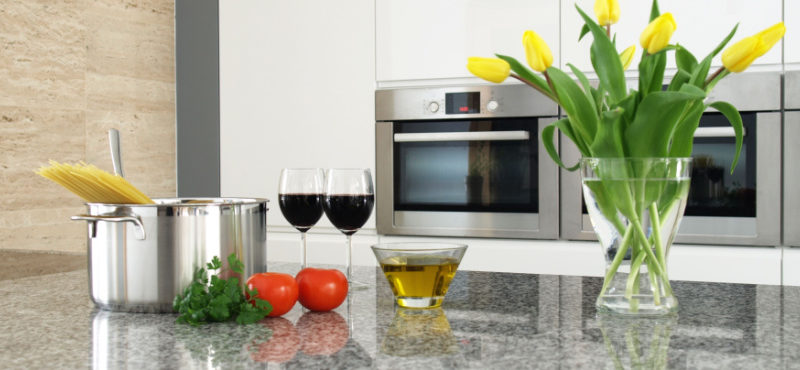Granite countertops provide an aesthetically pleasing and durable surface that adds beauty and style to your kitchen surfaces. While granite countertops are easy to clean, their porous nature does mean they are prone to absorbing water – making some ongoing maintenance necessary to keep them in working order and looking beautiful.
Although resealing might not always be necessary, natural wear and tear will occur over time and eventually require your attention to prevent permanent damage. That is why reapplying sealant at the right intervals will ensure your granite remains free of stains and fully functional. Here are a few tips to help you determine when you should reapply sealant to your granite countertops to keep them in the best condition.
Consider the Color
The color of your granite is a big factor in deciding the frequency of resealing for your granite countertop and kitchen surfaces. Darker granite colors tend to be denser than light colors granite, making them more resistant to liquid staining and frequent treatment likely unnecessary.
On the other hand, lighter-colored granite will need more frequent treatment to protect it from liquid spills and acidic materials like wine. That is why you should first check the color specifications of your granite to determine how often you should reapply sealant to keep it in good condition.
Check the Porosity
Granite is a porous material that tends to absorb air and liquid due to the tiny gaps in its surface. When you spill liquid on granite surfaces, it can lead to stains and other kinds of permanent damage from absorbing it. This is made even worse with acidic or colored liquids such as wine, so be sure to clean it up quickly.
Another thing to keep in mind is that different stones make up granite to give it its unique appearance, which affects its porosity. If you are unsure of the porosity of your granite, you can test it by pouring a few drops of lemon juice on the surface. Depending on how quickly it absorbs the juice, that will give you some idea of how dense the granite is.
Consider the Finish
In addition to a granite surface’s porosity and color, the finish of the countertop can also determine how often your granite may need resealing. Polished or glossy granite surfaces tend to repel liquid better, making them easier to clean and maintain. On the other hand, leathered or honed surfaces may offer a more natural stone appearance and finish but also tend to be more prone to absorbing liquid and being damaged. If you are unsure how to best care for your granite surfaces, consider consulting the manufacturer for the best care practices.
Routine Resealing
With advancements in resealing technology, granite can now go even longer than ever without resealing. This is ideal if you would prefer to wait until resealing is necessary, as depending on the color and makeup of the granite in your home, it may not need resealing that often. The only thing to keep in mind is that you need to test your countertops periodically to ensure it stays in good condition.
If you prefer to follow a routine approach, you can instead have your granite kitchen surfaces resealed routinely. Many homeowners reapply sealant to their granite every 6 to 12 months as a preventative measure. Furthermore, there is no such thing as oversealing your granite, so you can decide how often you wish to do it.
Work with Professionals
Tops Kitchen Cabinets is a family-owned business providing wholesale kitchen cabinets and granite countertops in Florida. If you are in the market to revamp your kitchen’s aesthetics with contemporary influences, contact our team today to get started!

